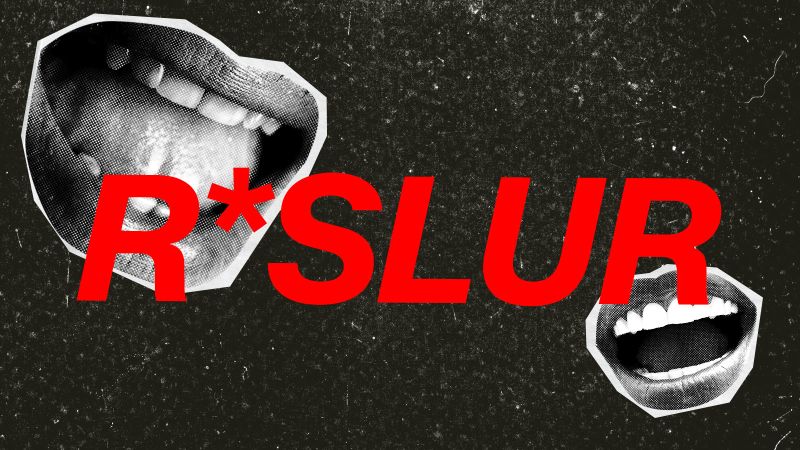How The "R-Word" Became Normalized: A Deep Dive Into The Issue

Welcome to your ultimate source for breaking news, trending updates, and in-depth stories from around the world. Whether it's politics, technology, entertainment, sports, or lifestyle, we bring you real-time updates that keep you informed and ahead of the curve.
Our team works tirelessly to ensure you never miss a moment. From the latest developments in global events to the most talked-about topics on social media, our news platform is designed to deliver accurate and timely information, all in one place.
Stay in the know and join thousands of readers who trust us for reliable, up-to-date content. Explore our expertly curated articles and dive deeper into the stories that matter to you. Visit Best Website now and be part of the conversation. Don't miss out on the headlines that shape our world!
Table of Contents
How the "R-Word" Became Normalized: A Deep Dive into the Issue
The casual use of the "R-word," a derogatory slur targeting individuals with intellectual disabilities, remains a pervasive issue despite decades of advocacy for its eradication. This seemingly innocuous slip of the tongue, often dismissed as playful banter or unintentional, carries significant weight, perpetuating harmful stereotypes and contributing to a culture of exclusion and disrespect. Understanding how this word became normalized is crucial to dismantling its power and fostering a more inclusive society.
The Historical Context: A Legacy of Stigma
The normalization of the "R-word" is deeply rooted in historical attitudes towards disability. For centuries, individuals with intellectual disabilities faced significant social stigma, often relegated to institutions and treated as less than human. This dehumanization paved the way for derogatory language, including the "R-word," to become commonplace. The word itself carries a weight of history, reflecting a time when understanding and acceptance were sorely lacking.
Media's Role: Amplifying Harmful Stereotypes
Media, both past and present, has played a significant role in perpetuating the use of the "R-word." From early comedic portrayals relying on harmful stereotypes to more recent instances where the word slips into casual conversation, the media's influence is undeniable. While progress has been made, the casual use of the word in films, television shows, and even online content still occurs, normalizing its use for a new generation. This constant exposure reinforces negative perceptions and makes it harder to challenge the ingrained use of this offensive term.
The Power of Language: Words Shape Perceptions
The impact of language on societal attitudes cannot be overstated. Words shape our perceptions, influencing how we view ourselves and others. The "R-word" isn't just a word; it's a weapon that perpetuates prejudice and marginalization. It contributes to a climate of fear and shame, preventing individuals with intellectual disabilities from fully participating in society.
Challenging the Status Quo: A Call for Action
Changing ingrained societal attitudes requires a multi-pronged approach:
- Education: Raising awareness about the harmful impact of the "R-word" is crucial. Educational initiatives in schools, workplaces, and communities should prioritize inclusive language and respectful communication.
- Media Responsibility: Media outlets must take responsibility for their role in perpetuating harmful stereotypes. Self-regulation, coupled with critical analysis of language used in content, is essential.
- Individual Accountability: Individuals must actively challenge the use of the "R-word" whenever and wherever they encounter it. This includes speaking up when friends, family, or colleagues use the word, even unintentionally.
- Positive Representation: Promoting positive and accurate portrayals of individuals with intellectual disabilities in media is vital to counteract negative stereotypes. This requires intentional effort from media creators and consumers alike.
Moving Forward: Building a More Inclusive Future
Eradicating the "R-word" is not simply about avoiding a specific term; it's about fostering a culture of respect, inclusion, and understanding. It requires a collective commitment to challenge harmful language and promote positive representations of individuals with intellectual disabilities. By understanding the historical context and the ongoing impact of the "R-word," we can actively work towards a future where everyone feels valued, respected, and included. Let's choose our words carefully and build a more inclusive society, one word at a time. Learn more about disability advocacy groups like [link to a relevant organization] and contribute to the ongoing effort for change.

Thank you for visiting our website, your trusted source for the latest updates and in-depth coverage on How The "R-Word" Became Normalized: A Deep Dive Into The Issue. We're committed to keeping you informed with timely and accurate information to meet your curiosity and needs.
If you have any questions, suggestions, or feedback, we'd love to hear from you. Your insights are valuable to us and help us improve to serve you better. Feel free to reach out through our contact page.
Don't forget to bookmark our website and check back regularly for the latest headlines and trending topics. See you next time, and thank you for being part of our growing community!
Featured Posts
-
 Karen Read Murder Trial Witness Testimony Updates
Jun 03, 2025
Karen Read Murder Trial Witness Testimony Updates
Jun 03, 2025 -
 Aaron Taylor Johnson And Jodie Comer A Steamy New Photo
Jun 03, 2025
Aaron Taylor Johnson And Jodie Comer A Steamy New Photo
Jun 03, 2025 -
 Ohio Parents Outsmart Rising College Costs Creative 529 Plan Strategies
Jun 03, 2025
Ohio Parents Outsmart Rising College Costs Creative 529 Plan Strategies
Jun 03, 2025 -
 The 31 Year Mortgage Is It The New Standard For First Time Homebuyers
Jun 03, 2025
The 31 Year Mortgage Is It The New Standard For First Time Homebuyers
Jun 03, 2025 -
 Jets Capable Of Carrying Nuclear Weapons Strategic Implications
Jun 03, 2025
Jets Capable Of Carrying Nuclear Weapons Strategic Implications
Jun 03, 2025
Latest Posts
-
 From Washington To Brasilia Trumps Shadow Over Brazils Democratic Institutions
Aug 02, 2025
From Washington To Brasilia Trumps Shadow Over Brazils Democratic Institutions
Aug 02, 2025 -
 Brazils Democratic Crisis Examining Trumps Role And The Spread Of Populism
Aug 02, 2025
Brazils Democratic Crisis Examining Trumps Role And The Spread Of Populism
Aug 02, 2025 -
 Bitcoin Liquidation Clusters 121k 120k And 114 5k 113 6k Support Resistance
Aug 02, 2025
Bitcoin Liquidation Clusters 121k 120k And 114 5k 113 6k Support Resistance
Aug 02, 2025 -
 Dont Miss Out George Lopez Third Eye Blind And The Bridal And Quince Expo
Aug 02, 2025
Dont Miss Out George Lopez Third Eye Blind And The Bridal And Quince Expo
Aug 02, 2025 -
 Oyster Bay Woman Admits Guilt In 30 Million Political Access Fraud Scheme
Aug 02, 2025
Oyster Bay Woman Admits Guilt In 30 Million Political Access Fraud Scheme
Aug 02, 2025
